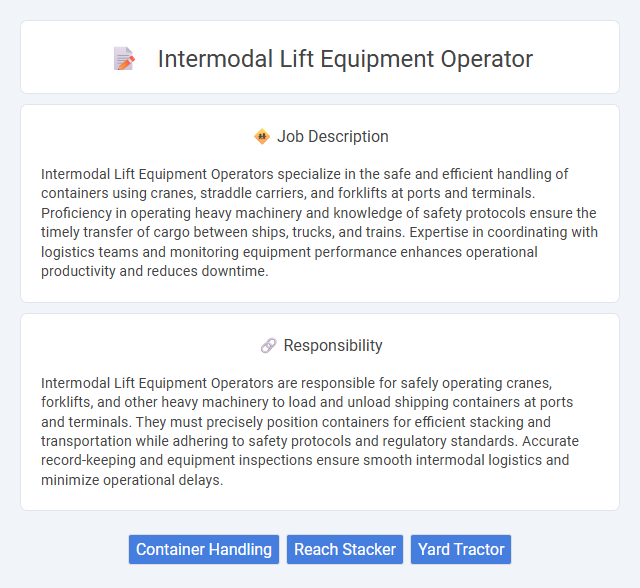
Intermodal Lift Equipment Operators specialize in the safe and efficient handling of containers using cranes, straddle carriers, and forklifts at ports and terminals. Proficiency in operating heavy machinery and knowledge of safety protocols ensure the timely transfer of cargo between ships, trucks, and trains. Expertise in coordinating with logistics teams and monitoring equipment performance enhances operational productivity and reduces downtime.
Individuals who are physically fit and able to handle heavy machinery and load lifting are likely suitable for the Intermodal Lift Equipment Operator role. Those with strong hand-eye coordination, good spatial awareness, and the ability to remain focused in a fast-paced environment have a higher probability of succeeding. Candidates with previous experience in equipment operation or logistics may find the job more manageable, while those prone to fatigue or poor concentration might struggle.
Qualification
Intermodal Lift Equipment Operators must possess specialized training in handling heavy machinery such as cranes, forklifts, and reach stackers, ensuring safe and efficient container movement across terminals. Certification from recognized institutions in occupational safety and machinery operation is often required, along with a strong understanding of intermodal logistics and safety regulations. Physical fitness, precise coordination skills, and the ability to operate equipment under diverse weather conditions are essential qualifications for this role.
Responsibility
Intermodal Lift Equipment Operators are responsible for safely operating cranes, forklifts, and other heavy machinery to load and unload shipping containers at ports and terminals. They must precisely position containers for efficient stacking and transportation while adhering to safety protocols and regulatory standards. Accurate record-keeping and equipment inspections ensure smooth intermodal logistics and minimize operational delays.
Benefit
Intermodal lift equipment operators likely enjoy competitive wages and opportunities for overtime pay due to the specialized skills required. Access to comprehensive health benefits and retirement plans is probable, given many employers prioritize worker welfare in this industry. Job stability and potential for career advancement may also be significant advantages in this role.
Challenge
The Intermodal Lift Equipment Operator position likely presents the challenge of operating complex machinery in dynamic environments where precision and timing are critical. Navigating tight schedules and coordinating with multiple transportation modes may require strong situational awareness and quick decision-making skills. Adapting to variable weather conditions and safety protocols could further contribute to the demanding nature of this role.
Career Advancement
Intermodal Lift Equipment Operators manage the loading and unloading of containers at shipping terminals, ensuring efficient cargo transfer between trucks, trains, and ships. Career advancement opportunities include progressing to supervisory roles, such as Terminal Supervisor or Operations Manager, leveraging experience in logistics and equipment handling. Specialized training in advanced machinery operation and safety protocols enhances prospects for higher-paying positions within global supply chain management.
Key Terms
Container Handling
Intermodal Lift Equipment Operators specialize in the safe and efficient handling of shipping containers using cranes, forklifts, and reach stackers at ports and rail yards. Their expertise ensures seamless container transfer between ships, trucks, and trains, optimizing supply chain logistics and reducing turnaround times. Proficiency in container weight distribution and safety regulations is crucial for minimizing damage and maintaining operational workflow.
Reach Stacker
An Intermodal Lift Equipment Operator specializing in Reach Stacker operation efficiently handles cargo containers within shipping yards and terminals. Mastery of the reach stacker enables precise stacking, loading, and unloading of containers, optimizing space and ensuring timely cargo movement. Proficient operators contribute to streamlined logistics by maintaining safety standards and minimizing equipment downtime during intermodal freight transfer.
Yard Tractor
Yard Tractor operators in intermodal lift equipment roles efficiently maneuver chassis and containers within container yards, ensuring seamless transport between shipping vessels and storage areas. Mastery in handling heavy-duty yard tractors improves operational flow, minimizes turnaround times, and supports intermodal logistics by linking rail, truck, and ship transportation modes. Proficiency in safety protocols and equipment maintenance is critical to prevent delays and maintain yard productivity.
 kuljobs.com
kuljobs.com